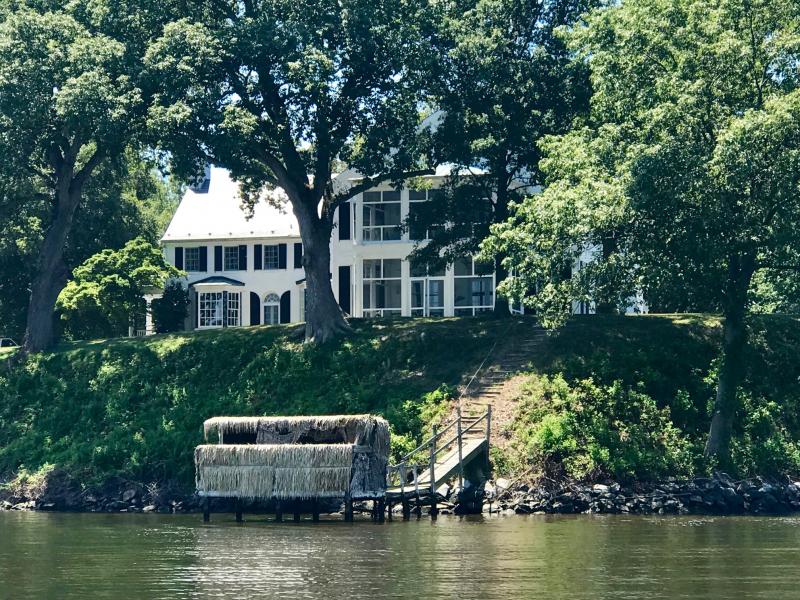Surviving flesh-eating minnows, heat wave and paddleboard crabbing
The heat wave that broke late Monday night and early Tuesday morning ended six days of exceedingly hot weather. Paul Walker, a senior meteorologist at Accuweather, said a heat wave is defined as several days with high temperatures over 90. This one felt like a longer heat wave than any I remember from the past.
Walker said the last time we had a six-day heat wave was last year, from June 28 through July 3. “In a normal year, your part of Delaware usually gets about 28 days with temperatures of 90 or greater. But I’ve heard that in this heat wave there wasn’t much of a sea breeze, and high humidity also made it feel warmer. Some weather people call it heat index. At Accuweather we call it Real Feel. The humidity can make the temperature feel 10 degrees hotter than it is,” said Walker. “The body cools itself through perspiration but when the humidity is high we don’t perspire as much and that can make it feel even hotter.”
For me, that’s when it feels like the heat clings to your skin.
But this year’s heat wave was actually hotter than last year's. Walker said the lowest high during this heat wave was 93 compared to last year when the lowest highs were 90, 91 and 93. “This year we had highs between 93 and 98.”
He said he expected July to end up as one of the hottest months on record.
Crabs on the Wye River
A waterman at Schnaitman’s, over on the Wye River, told us crabs have been large but scarce recently.
He runs a trotline in the Wye, due west of us by about an hour and a half, on Maryland's Eastern Shore. “I caught a bushel of number ones right off the bat this morning and then they stopped.”
He runs his trotline starting at about 3:30 a.m. Brings his catch in six or seven hours later for the live market. The Wye is renowned for its large crabs.
We were anchored in Shaw Bay at the lower end of the river and decided we better not miss a chance. A pot we had on board would probably only hold about four or five crabs, but we could steam them in batches if necessary.
Or just set them out in the sun. It was hot. Sizzling hot. High 90s hot.
Hot enough to steam crabs without a pot hot.
The water temperature in the Wye, near the surface, was well up into the high 80s. Close to shore, where a southwest wind piled up the day’s heat, we stood in water in the 90s.
“I’ll give you some tips,” said the waterman. “Get into three or four feet of water, even shallower if you can, and make sure it’s hard bottom. If they're around, that's where they will be.”
Schnaitman’s has been renting skiffs and providing folks with handlines, chicken necks and crabbing nets for many decades. They steam crabs there in their humble riverside building. Smelling crabs steaming with Old Bay makes you want to get in the river and catch your own.
All we had to crab from was a couple of paddleboards; but where there’s a will there is a way. I threw the chicken necks, ball of string and weights into a five-gallon plastic bucket and secured it to the front of the board. I slid the crab net under bungee cord on the deck and headed for shore. Albert was cleaning a water filter on his boat, so he paddled over a half hour later.
I set out four handlines around the board and stood on the hard bottom, waiting patiently. There was grass around me which I thought boded well for crabs. Then I felt the grasses rubbing against my legs.
Grasses, but no crabs. I didn’t mind not being clawed by crabs, but I would have liked to have seen them tugging a line or two.
Then the grasses became more persistent. That's when I realized I was under attack by flesh-eating minnows. They were up and down my legs exfoliating and all kinds of stuff. Cleaned me up pretty good.
Julia told me about a spa she went to near Baltimore where the Korean proprietors put your legs in a water-filled tub with little fish and they nibble off dead skin and other goodies.
I was getting the same treatment and it wasn’t costing me a thing other than what I paid for chicken necks and handlines.
Other than one good-sized ray that I passed going ashore, we saw little else remarkable.
I can’t confirm whether the Wye River crabs are large this year, but I can definitely confirm that they were scarce, at least during the heatwave.
About the MSC Gayane
A few final words about the cocaine-laden vessel pulled over recently in the mouth of Delaware Bay. Credible reports indicate that her operators put up a $50 million bond to obtain her release from the Customs and Border Protection service that seized the vessel. She left Lewes about 10 days ago, minus 17.5 tons of cocaine and several crew members who were arrested for being involved in bringing the illicit cargo aboard somewhere between South America and the Bahamas.
Chief Seth Johnson of the U.S. Coast Guard said 55 Coast Guardsmen deployed from Cape May were part of the multi-agency force, onshore and on vessels, that boarded the vessel June 16 after it was ordered to be anchored in the Breakwater Anchorage due north of Lewes a few miles out in Delaware Bay.
“There were also three Coast Guard small boats from Stations Philadelphia and Cape May involved. Seventeen local, state, and federal partner agencies were represented during the operation. There was no cutter involved during the operation,” said Johnson. “The vessel was boarded at anchorage by a multi-agency law enforcement team. Then, under escort, the vessel transited in to Philadelphia. Contraband was seized from the vessel the following day while the vessel was moored.”
Richard Bratz, spokesman, said 15 Delaware State Police personnel were part of the boarding deployment. He said in addition to the police special operations team, members of the aviation and maritime units were involved as well as members of the explosive ordnance unit.
After the vessel left Lewes, it was reported to be on its way to Rotterdam in the Netherlands, the final destination for most of the thousands of containers it was carrying at the time it was seized, and the cocaine discovered and removed.
Customs and Border Protection spokesman Steve Sapp said after the whole mess is sorted out, the contraband cocaine will be destroyed.
Reports about previous seizures indicate that cocaine is ultimately destroyed by burning in commercial incinerators.
Everything’s hot this time of the year.























































